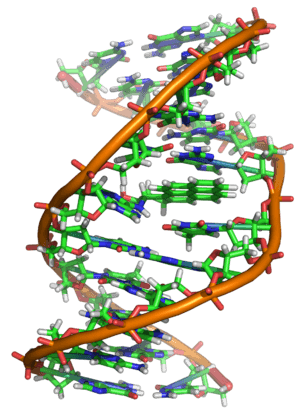Mutagen facts for kids
A mutagen is something that can change the genetic material of an organism. Think of genetic material like the instruction manual for a living thing. Mutagens cause tiny mistakes, called mutations, in this manual. These mistakes can sometimes lead to problems. Many mutagens can also cause cancer, which means they are also called carcinogens.

Contents
What are Mutagens?
Mutagens are agents that can change the DNA of an organism. DNA is like the blueprint for all living things. When DNA changes, it's called a mutation. Some mutations are harmless, but others can be very serious.
Types of Mutagens
Mutagens can be different things. They can be:
- Chemicals: Many chemicals can act as mutagens. For example, some chemicals found in smoke or certain industrial substances.
- Radiation: This includes things like ionizing radiation, which is a strong type of energy. X-rays and radiation from radioactive materials are examples.
- Biological agents: Some viruses or bacteria can also cause changes in DNA.
How Mutagens Work
Mutagens work by directly interacting with DNA. They might break DNA strands, change the chemical structure of DNA bases, or cause errors when DNA is copied. These changes can then lead to mutations.
Mutagens and Health
When mutagens cause mutations, it can affect how cells work. If a cell's DNA is damaged too much, it might not function correctly.
Mutagens and Cancer
Many mutagens are also carcinogens. This means they can cause cancer. Cancer happens when cells grow out of control because of changes in their DNA. Not all mutations lead to cancer, but many cancers start with mutations caused by mutagens.
Testing for Mutagens
Scientists use special tests to find out if something is a mutagen. One common test is called the Ames test. This test uses special bacteria to see if a substance causes mutations. If the substance causes mutations in the bacteria, it might also be a mutagen for other living things, including humans.
Examples of Mutagens
Some common examples of mutagens include:
- Ionizing radiation: Like gamma rays or X-rays.
- Certain chemicals: Such as some bromine compounds or benzene.
- UV light: Too much sunlight can cause mutations in skin cells, which is why it's important to protect your skin.
See also
 In Spanish: Mutágeno para niños
In Spanish: Mutágeno para niños
 | Aaron Henry |
 | T. R. M. Howard |
 | Jesse Jackson |

